Lutherstr. 11
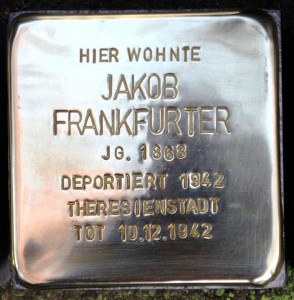
A Magician and a Wanderer
“I can remember Jakob Frankfurter best of all because when he visited us he brought along a big suitcase from which he made wonderful things appear as if by magic. He also brought surprises out of the pockets and sleeves of his suits or coats, as if by magic. We were delighted by this and jumped all around the room. He also was a wonderful story teller. He took my parents, my brother and me on short hikes on the Alb Mountains, and we often sang songs together”.
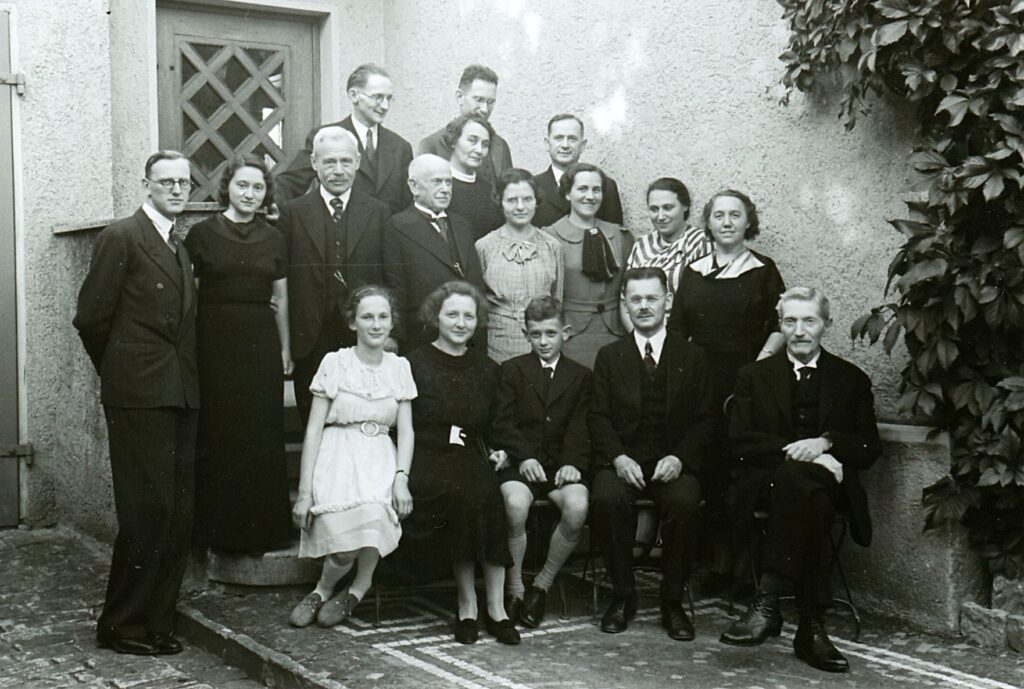
Doris Bernheim in front, sitting left
This is how Doris Doctor (late), née Bernheim, born in 1923, remembers her great-uncle Jakob Frankfurter. The get-togethers she describes probably took place in the year 1930, when Jakob Frankfurter was 62 years old and would still remain in his position in the family company for two more years. From 1901 to the end of 1932 he was a full partner, together with his brother Sigmund, in the company of Frankfurter Brothers OHG which had been founded in 1896. It is hard to determine how much involvement he had in the actual operation of the company. Even though his brother Sigmund was This is how Doris Doctor (late), née Bernheim, who was born in 1923, remembered her great-uncle Jakob Frankfurter. The get-togethers she describes probably took place in the year 1930, when Jakob Frankfurter was 62 years old and would still continue working in his position in the family company for two more years. From 1901 to the end of 1932 he was a full partner with his brother Sigmund in the Frankfurter Brothers Company which had been founded in 1896. It is hard to determine how much involvement he had in the actual operation of the company. While his brother Sigmund was involved in many social activities, Jakob is not remembered in the same way. After leaving the company, the unmarried entrepreneur moved to Stuttgart but also kept his official address in Gőppingen (Burgstrasse 12). That house, and with it the rented apartment, had been owned by the Dittus family since 1936.
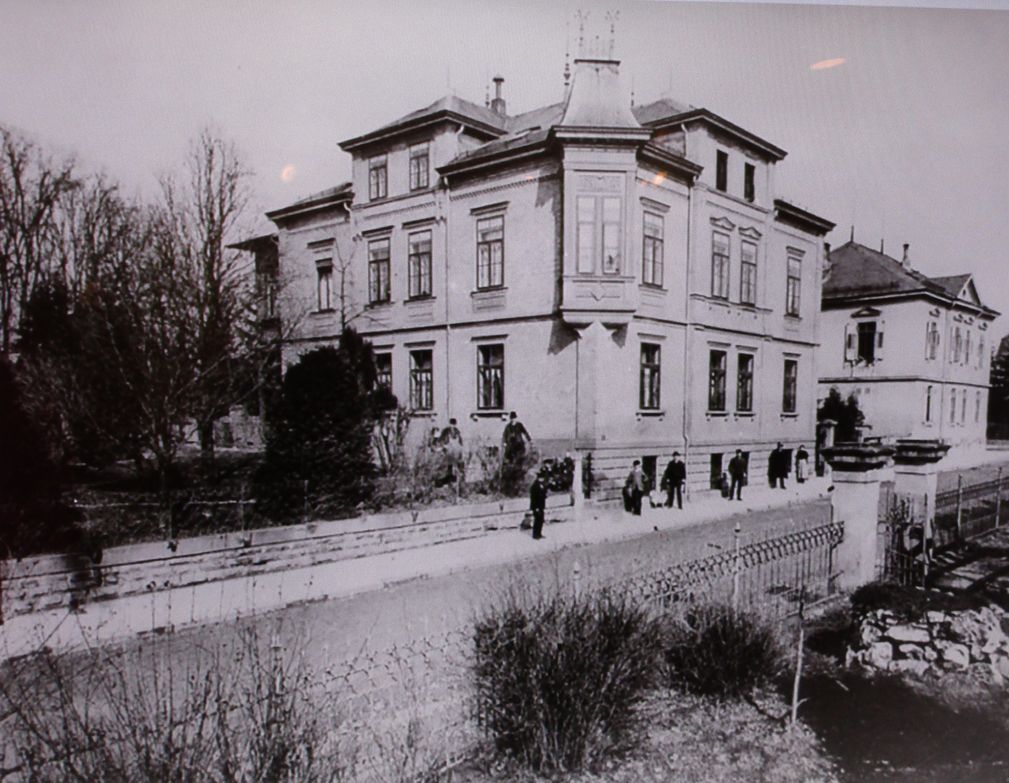
But neither the Dittus family nor his former neighbours could remember Jakob Frankfurter, which leads to the conclusion that the apartment in Gőppingen was rarely used. But according to records at the residents’ registration office, his niece, Marie Bach, lived in her uncle’s (empty?) apartment in Gőppingen for several weeks in 1936. ‘Bach’ was the married name of Jakob’s sisters Ida and Mathilde who did not live in Gőppingen. Jakob must have felt close to the family of his sister Mathilde Bach because in photos of ‘Bach family’ gatherings Jakob appears to have been the only ‘Frankfurter’ present. The childhood memories mentioned above confirm this assumption because Doris Doctor’s grandmother was Mathilde Bach.
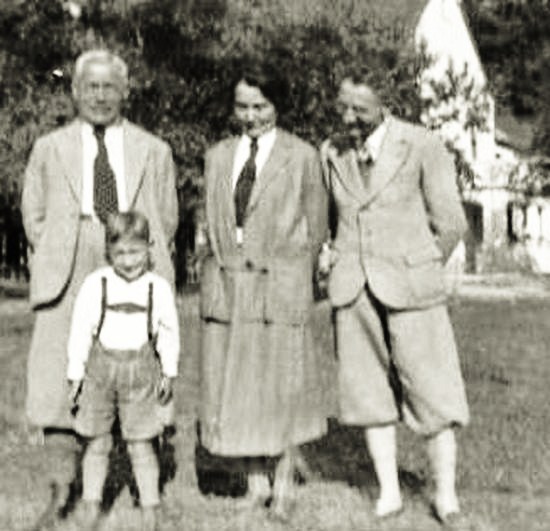
his nephew Alfred Bach and his son
Disrupted Retirement in Stuttgart
During the time when Jakob Frankfurter lived in Stuttgart, his first address where he lived is listed as Vogelsangstrasse 103, and according to the restitution records it was a four-room apartment. Beginning in May 1940, a new address is listed for him in the Stuttgart city directory (Werfmershalde 12), which is also listed in the Stuttgart ‘Jewish list’.
Most likely Jakob Frankfurter was forced to make this move because starting in May 1939, Nazi legislation forbade Jewish citizens to live in the houses together with ‘Aryans’, and this law was gradually being enforced. Also living in the building were Dr. Benno and Ida Jakob, a Jewish couple who were medical doctors, as well as a single Jewish woman named Anna Wieler. Dr. Benno Jakob had been appointed administrator by the building owners which gave him extensive authority. That made it possible for Dr. Jakob to install a radio set in the basement on which foreign broadcasts could be received. Jakob Frankfurter’s housing situation must have become an increasing worry for his sister-in-law Hedwig Frankfurter, who was living in Gőppingen. In a letter dated June 26, 1941, she wrote: “Hopefully my brother-in-law will not lose his Clara.” Hedwig’s concern was understandable because an ‘Aryan’ woman who worked for a ‘Jew’ was socially ostracised. Clara, whose identity could unfortunately not be confirmed, must have been much more than a housekeeper for Jakob. It was known within the family that Jakob and Clara were a committed couple, but such a union could not be officially sanctioned. Rather than religious differences, class and social standing would have prevented such a marriage (before the Nazi time). For the time being Clara wanted and could stay with Jakob, but on November 4, 1941, his sister-in-law already mentioned: “Jakob had to suddenly leave his apartment, and if he receives permission to move here, we will take him in so that he has a home again. For the present he is living with Babette M.” It remains a question why Jakob would already move out of the apartment at Werfmershalde 12 at that time because the other inhabitants did not have to leave there until April 1942. Did Jakob find out about the illegal radio installation and moved out because he was worried that it would be discovered?
Babette M. (= Marx), who is mentioned in the above letter, was a Jewish businesswoman in Stuttgart in whose company Leopold Fleischer, a distant relative of Jakob, was an executive officer (See Stumbling Stones biography Rosa Fleischer). Later, Mrs. Marx was also murdered by the Nazis. In this same letter of November 4 appears the only mention that Jakob Frankfurter was planning to flee Germany: “He is being sponsored by Johanna as well as Ida, but this is of no use right now. Even the route through the intermediate country of Cuba is closed.” The sponsor involved is probably his niece Johanna Bernheim, née Bach, who lived with her family in the USA since July 1939.Bernheim, née Bach, who had lived with her family in the USA since July 1939.
Involuntary Return to Goeppingen
Jakob’s move to Lutherstrasse 11 in Gőppingen took place shortly thereafter. In a letter dated December 3, 1941, his sister-in-law Hedwig wrote: “Uncle J. has settled in well. He is like a clock; in the morning he reads the newspaper, then he studies Italian, takes a walk for an hour, and in the afternoon he does the same all over again. He does not disturb me very much because he spends most of his time in his room. Clara and I cook peacefully next to each other…”
In January 1942, Hedwig Frankfurter still writes: “My brother-in-law is glad that he can be with us,” but at the beginning of June 1942 they were all threatened by a forced move to Oberdorf near Bopfingen, where the living conditions were known to be miserable. Hedwig writes: “Jakob is very depressed and looks with gloom toward the future. His Clara takes care of him lovingly.” However, the move to Bopfingen would not take place because something much worse would happened: On August 28, 1942, Jakob Frankfurter, together with his older brother Sigmund and his sister-in-law Hedwig, was deported via Stuttgart to the Theresienstadt concentration camp and died there at the age of 74 on December 10 of the same year due to the murderous prison conditions. His brother Sigmund died a few days after him, and his sister-in-law Hedwig was murdered at Auschwitz concentration camp in 1944.
Murdered: Brother, Sister-in-Law, Sister, Niece
Jakob’s widowed sister Ida Bach, who had lived in Augsburg, also died at Theresienstadt concentration camp. His niece Marie Bach, the daughter of his sister Mathilde, was murdered in Auschwitz. Marie Bach, who was born in 1902 in Augsburg, worked as a home economics teacher: first in Esslingen at the ‘Wilhelmspflege’, a Jewish boarding school, and later in Switzerland. After the beginning of the war, her place of refuge in Paris would no longer provide her with safety. In May 1940 she was interned in Camp Gurs in south western France. There Marie Bach, who was a religious, unmarried woman, dedicated herself unselfishly to the care of the other internees and received high praise. She would have had a chance to escape but declined to flee because of her feeling of responsibility.
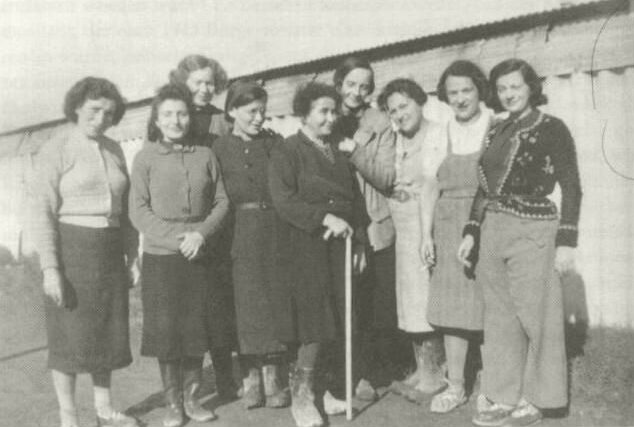
Late Doris Doctor still had childhood memories of her aunt Marie: “She was a small, thin person who was shy and did not talk very much with me, but when she did, she was friendly and loving. I was impressed that she would only eat from glass dishes. She explained that she felt very close to God. That impressed me, and I admired her. My mother, not Marie herself, explained the reason for this.” (As an orthodox Jewish woman, Marie did not want to use the dishes of her relatives who did not keep meat and milk products separate.)
The sons of Hedwig and Sigmund Frankfurter, who survived in exile, had the name of their aunt Ida Bach engraved next to the names of their parents and their Uncle Jakob on the tombstone which is located in the Jewish cemetery in Jebenhausen.
On November 25, 2011, Gunter Demnig installed a Stumbling Stone for murder victim Jakob Frankfurter in front of the house at Lutherstrasse 11 in the presence of his great-nieces Ruth Adler and Doris Doctor (late).

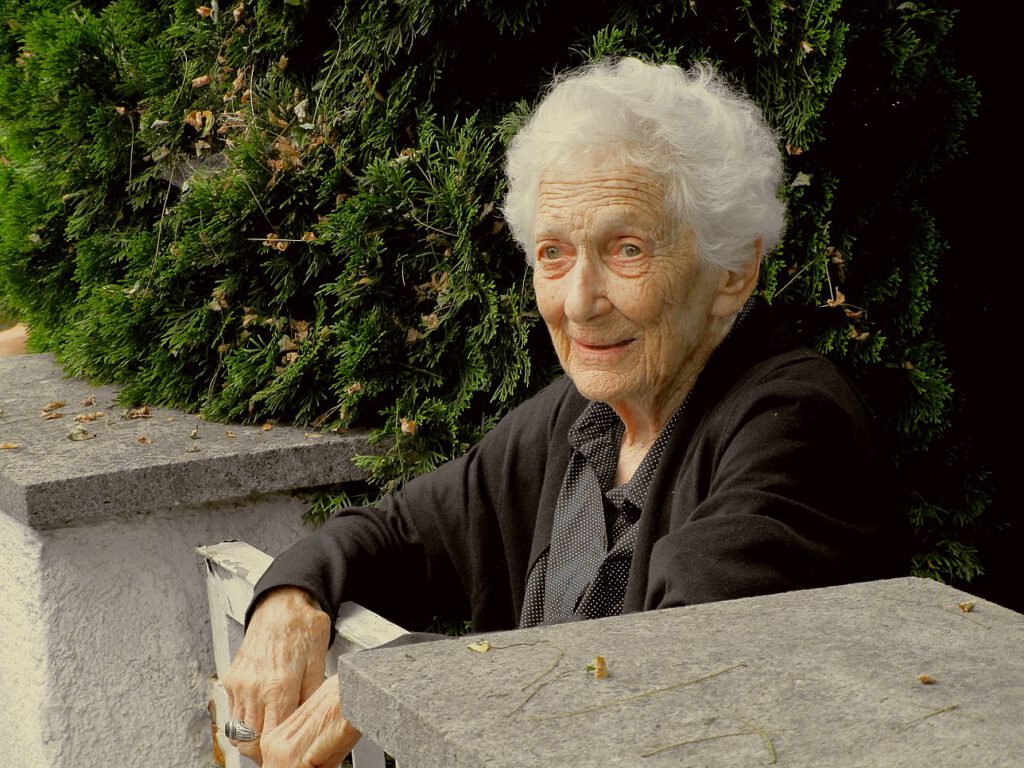
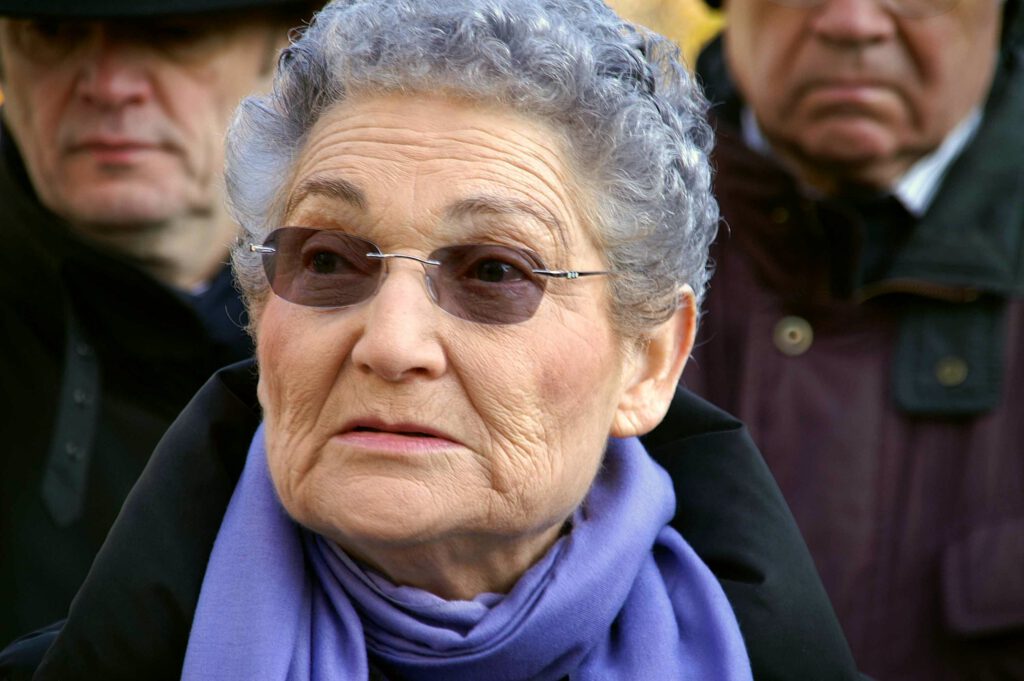
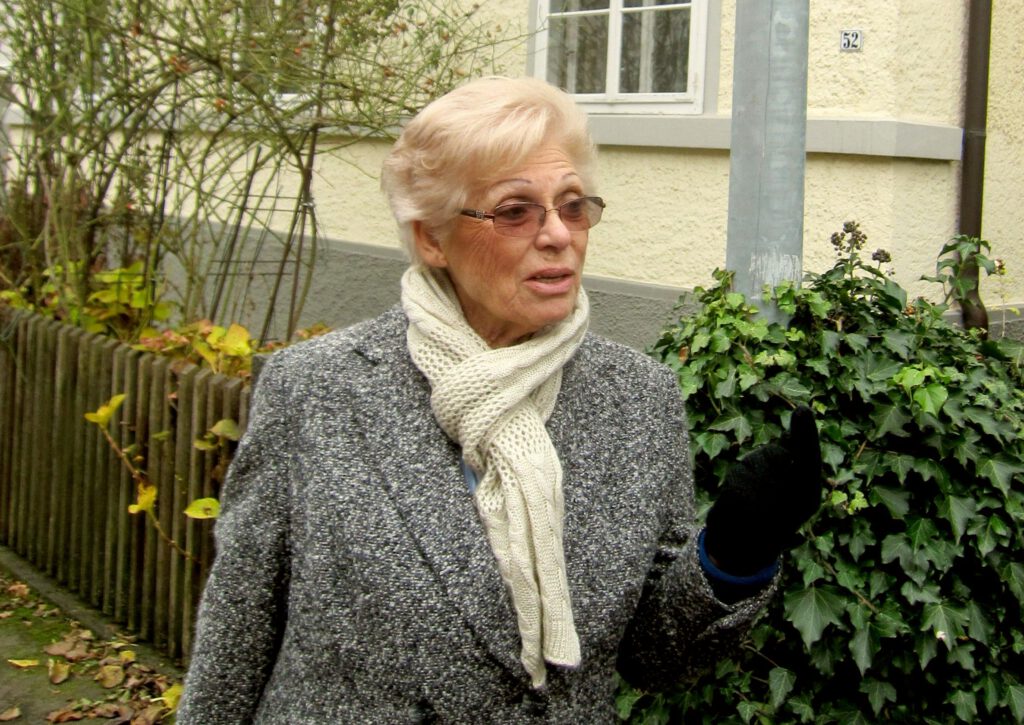
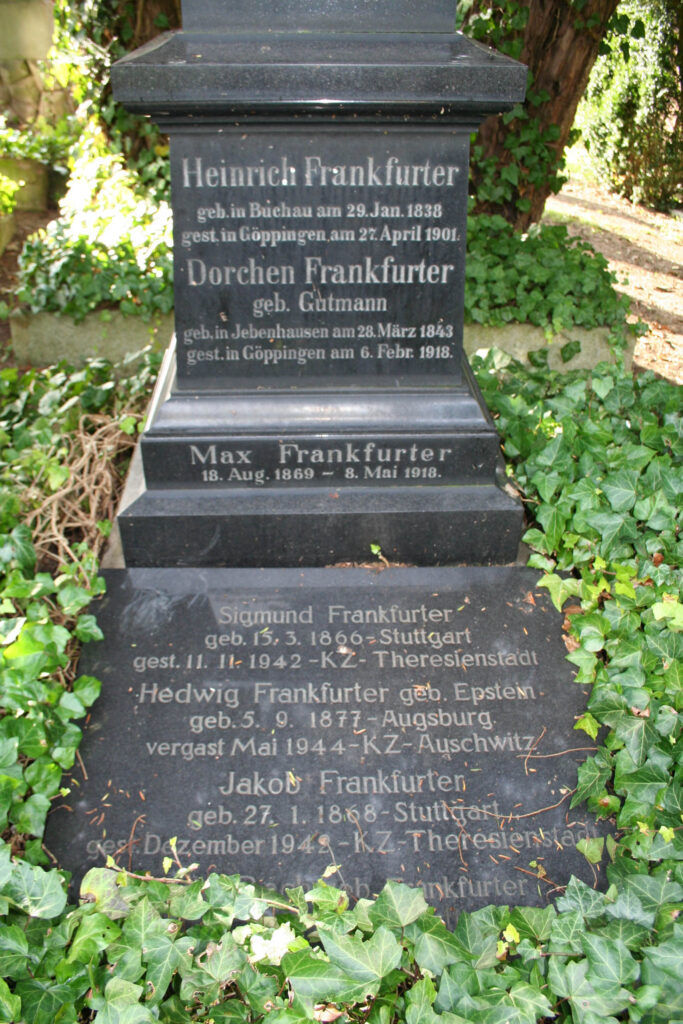
(May/25/ 2021, kmr/ir)


Leave a Reply